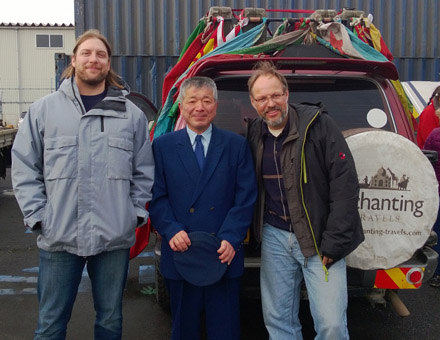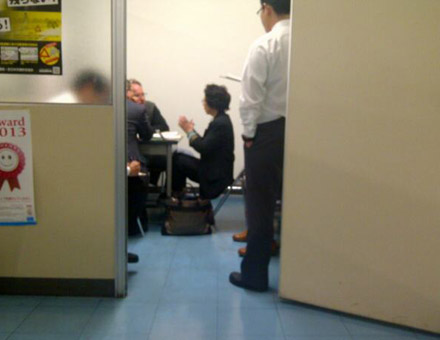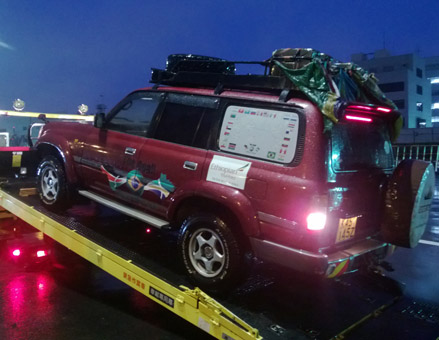
When arriving from Vladivostok at the port of Sakaiminato in Japan, the ferry representative informs me that officially I am not allowed to drive a Kenyan registered vehicle on Japanese roads as Kenya hasn't signed some International Convention from 1949. She also tells me with a hushed voice that only few Japanese policemen are aware of this restriction and we might therefore try to drive Pele across Japan anyway. The only alternative is to put Pele onto the back of a lorry and have him trucked to Yokohama. This, however, would be very expensive and somehow feels like violating the unwritten ethics of a road journey. Therefore, we decide to take the risk and drive Pele the 800km to Yokohama, hoping that we will not be caught by Japanese police.
The next evening and after a long day drive, we arrive in Tokyo, only a couple of kilometers north of Yokohama, without having been stopped by police. This is where the story should end. However, not really thinking through the implications, I decide to drive Pele to the airport the next morning to pick up a friend who will join us in Japan. When arriving at the airport entrance, I immediately realize that this is a foolish judgment error on my side. The fairly obvious hasn't occurred to me – there is lots of police at airports!
I am stopped by a friendly smiling security officer who asks me for my passport and driving license. Showing him my International Driving License issued by the Kenyan AA results in a slightly confused smile and in him consulting another police officer. Huddling over my driving license, they decide to consult a third officer who returns to me requesting the vehicle registration papers and asking me whether I also have a Japanese driving license. When I respond that I don't, a fourth police officer is involved and soon after, there are around 10 police men and women standing around Pele, looking through my documents and asking me the same questions over and over again – Why do you have a German passport but a Kenyan driving license? Where is Kenya? Why is your car registered in Kenya? How did you get a Kenyan registered car to Japan? Where did you enter the country? How long are staying you in Japan? Where did you spent last night? Where will you go next? Why did you come to the airport? Why don't you have a Japanese driving license?
 With the help of our route map printed on Pele's side windows, I explain our journey from Africa to Brazil again and again. Listening to me, the officers are smiling politely or just quietly shaking their heads. Some of them are busy speaking into their radios and I start to wonder whether I might have gotten myself in trouble. This impression is getting confirmed when a police vehicle arrives on the scene and two smartly dressed police officers emerge. They introduce themselves as Inspectors and inform me that they would take me to the airport police station to ask me some questions.
With the help of our route map printed on Pele's side windows, I explain our journey from Africa to Brazil again and again. Listening to me, the officers are smiling politely or just quietly shaking their heads. Some of them are busy speaking into their radios and I start to wonder whether I might have gotten myself in trouble. This impression is getting confirmed when a police vehicle arrives on the scene and two smartly dressed police officers emerge. They introduce themselves as Inspectors and inform me that they would take me to the airport police station to ask me some questions.
Thus, I leave Pele behind at the airport gate and sit in the back of the police vehicle for a short drive to the police station. There, I am taken to what looks like their interrogation room. What follows is a respectful but lengthy interrogation covering all the questions that I have answered multiple times already, with 6-7 police officers in the room. Only one of them is able to speak English and an almost comical scene evolves: he asks me questions and translates my answers to his colleagues who then ask follow-up questions in Japanese which he in turn translates into English for me. I have the feeling that this has some "Chinese Whisper" effect as I keep responding to questions which I have already addressed. After the interrogation is over, I am left in the room, with the English-speaking officer sitting opposite me at the desk. When I ask him what will happen next, he tells me that his colleagues will now brief their boss and contact Customs in Sakaiminato to verify my responses. With a friendly smile, he further informs me that I might be kept at the police station if they are not able to verify my responses today. This alarms me as I know that the Customs office in Sakaiminato is closed on Sundays – after our arrival on Friday, we had to rush to go through the customs procedure as otherwise we would have been required to wait until Monday. I am worried especially as we have a hard deadline to deliver Pele at Yokohama port tomorrow morning – otherwise we will miss the container ship and incur at least one week of delay to get Pele to the US which in turn will jeopardize our timeline for arriving in Brazil. I ask whether I am allowed to contact the German embassy for assistance. The answer is "no" - again delivered with a disarming smile.
We spend the next 3-4 hours in the interrogation room waiting for an answer that I strongly believe will not come on a Sunday. Initially, I feel anxious but after some time, my anxiety gives way to resignation and almost amusement. My "guard" quizzes me about our journey and to bring our travel experiences alive I show him videos from the bull jumping ceremony in Ethiopia, skiing in Uzbekistan and from driving and snowboarding over frozen Lake Baikal. He is so excited about these that he gets his colleagues one by one into the room so that they can also watch the videos and I end up giving a slide show of our journey to a group of 8 or 9 police officers. When I peek out of the interrogation room, I realize that the rest of the police station is almost empty as most of the officers have congregated around my laptop to watch the pictures and videos.

Eventually, a woman enters the room together with a distinguished looking police officer. He is introduced as the Head of the Airport Police Station and the woman explains to me that she is a German translator and has been requested to assist. Apparently, the police officers don't have faith in their or my English skills. Another interrogation ensues, with exactly the same questions that I have already been asked multiple times, this time with back and forth translations between German and Japanese. Again, there are 5 or 6 other police officers around who all have questions to add. After an hour of Q&A, the police officers leave, apparently to deliberate. Another hour passes until they return and explain through the translator that they haven't been able to reach the Customs Office in Sakaiminato – surprise, surprise! I am further told that they have decided to let me go if I sign a document stating that I will not drive again in Japan without a valid driving license. This document is drafted by hand in beautiful Japanese Kanji letters, then translated by hand into German and presented to me for my signature.
Afterwards, I am informed that Pele needs to be taken still tonight to Yokohama port. At this point, the police officers seem to approach the end of their shift and keen to get home and to get rid of me. They even organize a truck for transporting Pele and call our Japanese logistics agent to convince him to receive Pele on a Sunday evening instead of Monday morning. It is 6pm and dark when finally another police vehicle takes me back to the place where Pele is parked and a truck is waiting. In heavy rain, Pele is loaded onto the truck and taken to Yokohama and delivered at the port – ironically one day ahead of our schedule!
Throughout the entire day, there has not been the faintest indication of any corruption and all police officers have been very polite. I am relieved that this incident happened in Japan – I would have found it much more worrying if it had occurred in Iran or Russia. However, I am left wondering how all these police officers would have spent their Sunday if I hadn't shown up?

